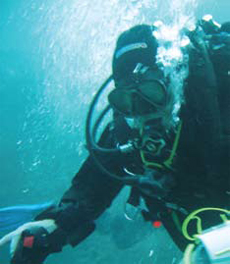




| Home | Features | Club Nights | Underwater Pics | Feedback | Non-Celebrity Diver | Events | 8 August 2025 |
| Blog | Archive | Medical FAQs | Competitions | Travel Offers | The Crew | Contact Us | MDC | LDC |

|

|
 
 |
 |
ISSUE 5 ARCHIVE - DIVING DENTISTCelehte FortuinHands up those of us who have gotten to the dive site, really excited, kitted up, buddy checked, final OKs, you're about to jump in, de-fog the mask... And nothing, nada, zip, zilch, niks?? You're dry as a bone. The Sahara has more water than your mouth at that point! As you turn to your buddy to ask for some of their, uhm, you know, fancy mask defogging spray bottle thingy, you can't help but wonder where all the saliva disappeared to? No one? Just me? Riiiggghhhttt.Let's see what else there is to saliva besides the awesome benefit as a mask defogging agent! Q: I took up scuba diving a year or so ago. Diving as often as I could and having completed my AOW, I went on a liveabord in Egypt. I love diving but have noticed from the beginning a sensation of a very dry mouth during the dives. I hoped this would eventually go away. Unfortunately it hasn't and more worryingly, during my holiday, it has been accompanied by some sensitive teeth as well. Is this normal or something that needs further attention? |
 |
|
A: Having spoken to a few instructor
friends, this seems to be a common
complaint not only amongst themselves,
but from their students too.
Saliva plays a critical role in our oral health and its functions include; cleansing, buffering, neutralizing pH, antimicrobial (balancing good and bad bacteria), lubricant, assisting in whole body water balance and helping us experience taste and digest food, to name but a few (so much for a bit of drool hey) Lubricating the mouth allows for smooth air flow, aiding talking and swallowing, and further protects mucosa against thermal, mechanical and chemical irritants. As a buffering agent it helps to neutralize the pH. After meals, our mouth is an acidic environment, ideal for breakdown of the mineral matrix of the enamel, allowing bacterial penetration and cavity formation. It assists in water balance (important for us as divers) in that during dehydration, saliva flow is reduced, causing thirst and an increased intake of fluids. |
||
|
There are multiple causes of xerostomia
(dry mouth). Quite a few of these directly
relate to our favourite pastime, while
knowledge of the rest will at least help
us manage it better.
As divers, the first, most obvious cause is breathing dry compressed air. Unable to drink water during a dive, the oral mucosa rapidly dries out leaving teeth and gums vulnerable and exposed. Stressful situations drastically reduce saliva flow. These may include, first ever dives, new dive experiences, feeling rushed, nervousness about the dive itself (depth, buddy, conditions, viz), the film Jaws... Dehydration as a cause of xerostomia is pretty high up on our list too. With as little as 8% dehydration, saliva flow rate is reduced to nearly zero! On average, a 70kg person consisting of 50kg of water with 8% dehydration relates to a loss of 4L! Besides wanting some saliva for defogging, we know that dehydration increases the risk of DCI, so drinking water before, between and after dives will greatly aid in saliva production and flow. Nearly 80% of commonly prescribed and over-the-counter medication lists dry mouth as a side effect! Antihistamines, antidepressants, anti hypertension, sedatives, tranquilizers, to name but a few. Commonly used anti nausea tablets being a big culprit on boat dive trips! Sjögrens Syndrome (an illness associated with dry eyes, dry mouth, increased oral infections and severely impaired salivary gland function) can be an underlying cause of xerostomia. A visit to either your GP or Dentist is required for a proper diagnosis. The total effect of suffering from xerostomia can now be better appreciated. An increased risk of dental caries is something we can certainly all do without for starters. If early carious lesions are not remineralised, tooth sensitivity will follow. Halitosis (bad breath), difficulty in swallowing, speaking, chewing, increased risk of oral infections and gingivitis are all negative side effects of xerostomia. The good news is there are a few things we can do to better manage these side effects, without having to hang up our fins.
|
 | |
|
By no means is this meant to be
exhaustive of the causes, effects, side
effects and management solutions for
xerostomia. I have tried to cover this with
a focus on factors that affect us as divers.
If anything mentioned here does not fit,
please contact your dentist. Happy
flossing (er, diving!)
Do you have burning dentistry issues? Celehte has all the answers. Chew your way through to the Contact page and send your query to the Diving Dentist. |
 | |
Previous article « Can I Dive With - Epilepsy? Next article » Paul Toomer: Agony Aunt Back to Issue 5 Index | ||